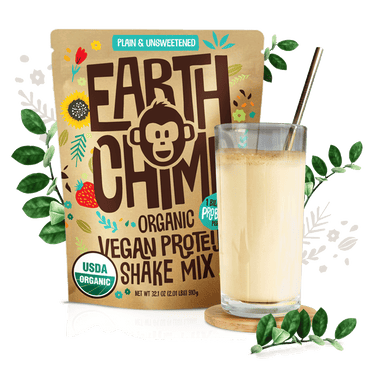Today, we're focusing on the side effects that don't always make the headlines. Knowing these can help you sip your shake without a hitch.
Armed with tips and insights, you'll learn how to integrate these powders into your diet effectively. By the end, you'll navigate your way through the world of plant-based protein with confidence, ensuring your choices contribute positively to your health journey.
Exploring What Plant-Based Protein Is
For the plant-forward eaters, plant-based protein is like finding a treasure chest in your backyard. Sourced straight from Mother Nature's pantry—think peas, soy, and hemp—these proteins are more than just muscle builders. They're your ticket to a well-rounded plate, packed with good vibes for your body.
Plant proteins have their own style, different from what you get from animal sources. They work through our bodies in their special way. Let's get to know some of the key players:
-
Pea Protein: Your muscle-building ally, frequently featured in many protein powders for its ability to support muscle growth.
-
Hemp Protein: The laid-back champion, offering a mix of high-quality vegan protein alongside healthy fats and fiber to keep your diet in harmony.
-
Soy Protein: A dynamic contributor, known for its high protein content and versatility, making it a popular choice for those looking to enrich their diet with plant-based power.
Adding these proteins to your daily routine is a way to meet your protein needs. But it's not all about muscles; it's about adding a splash of health benefits to your diet. However, it's wise to be aware of their effects too. Let's make every meal or shake work towards better health.
Potential Side Effects of Plant-Based Protein

Digestive Issues
Sometimes, plant-based protein powders, like those made from peas or using protein isolate, can be a bit rough on our stomachs. You might notice some gas, bloat, or just feel a bit off. It's usually because our bodies can find plant proteins a bit harder to break down.
If you're getting a bit of tummy trouble from your shake, try easing into it with smaller scoops. Your gut might just need a little time to get used to it.
Allergic Reactions and Intolerances
Heads up if you're diving into vegan protein powders! Some folks might find they're allergic to ingredients like soy. Always give the label a quick peek to make sure you're not picking something that'll make you feel icky.
And if you know you've got a sensitive system, look for a powder that's playing it cool without the major allergens. It's all about finding what feels good for you.
Potential for Nutritional Deficiencies
While grabbing your protein from a powder is super convenient, don't forget it's not the whole foodie picture. Relying too much on powders might mean you miss out on other important goodies like vitamins and minerals.
Also, don't forget to pair your shake with whole food sources that are rich in protein like beans, nuts, and seeds. Imagine them as your shake's best friends. They make sure you're getting all the nutrition you need. It's like putting together a great team for your health.
Impacts on Blood Sugar Levels
Watch out for sneaky sugars in many vegan protein powders. They can send your blood sugar on a bit of a roller coaster. Opting for low-sugar options is a smart move. And keep an eye out for artificial sweeteners too—they can affect everyone a bit differently.
Remember, not all protein powders are created equal in the carb department. A quick label check can help you stick to your dietary goals without any surprises.
Understanding Common Causes of Protein Powder Side Effects
Ever notice how a protein powder that's like a hug in a mug for your friend might not sit right with you? That's because we're all a bit unique in how we handle different foods and supplements.
It could be the type of protein, the brand, or maybe something hidden in the ingredients that your body's not too happy about. It's all about listening to your body and finding what works best for you.
Navigating Side Effects and Safe Usage in Your Vegan Diet
Dealing with side effects from vegan protein powders can be easy with the right approach. Start slowly, choose the right brand, and balance your diet. Each body reacts differently, so it's about finding what works best for you. These tips will help you use protein powder safely and effectively.
Starting Slowly with Protein Powder
Kicking off with vegan protein powder? Take it easy and start with just a little. Up the amount bit by bit. This way, your body gets comfy with this new buddy. If your tummy starts talking back, consider a simpler option like pea protein powder. It's often kinder to sensitive stomachs.
Diversifying Your Protein Sources
Don't let protein powder be your only snack. Toss in a mix of protein-packed treats like beans, nuts, and tofu. They're not just tasty; they're packed with all sorts of good stuff your body loves. Plus, they help you round up all those essential amino acids, the building blocks your body craves.
Choosing the Right Protein Powder Brand
It's essential to select the right protein powder brand. If one doesn't suit you, consider trying another. Ensure your purchase is from a reputable seller, and survey the available brands on Amazon. Check customer reviews to guide your choice, and always inspect the label for additives and allergens to find a powder that meets your needs.
Making the Right Choice with EarthChimp

As we come to the end of our green journey through the world of plant-based protein powders, we've learned a lot, right? Sure, there are a few things to think about, but oh, the benefits are huge! Especially when you find that perfect match for you. And guess what? That's what EarthChimp Organic Vegan Protein Powder is all about.
Our protein blend is all about being 100% organic, totally vegan, and packed with the kind of plant power that comes straight from nature. No weird additives, no artificial flavors, no GMOs, no added sugar, and absolutely no dairy. Plus, our blend of pea, pumpkin, sunflower, and coconut proteins offers a unique, nutritious combination that supports your body naturally. It is formulated with no gluten or gums to try make it as stomach friendly as possible
Don't just take our word for it; our EarthChimp family speaks volumes with their smiles and reviews on Amazon. Let's make filling up on plant-based protein a breeze and a blast, together!
Frequently Asked Questions About Vegan Protein Powders
What makes vegan protein powder a good source of protein for my diet?
Vegan protein powder offers numerous benefits. It's packed with essential nutrients, minus the dairy found in whey or casein. It's important to note that protein from plants can meet your protein intake needs beautifully, especially on a high protein diet. And it's kind to your tummy, too!
Can I replace meals with a protein shake?
While drinking a protein shake is a tasty way to up your protein, it's best not to skip meals. Whole plant-based foods give you nutrients that powders can't. So, enjoy your shake, but also munch on veggies, nuts, and fruits to balance your diet.
How much protein do I really need each day?
The amount of protein you need varies. It depends on your body and how active you are. Remember, protein is an essential macronutrient, important for muscles and more. If you're unsure, a chat with a healthcare expert can help you figure out your ideal protein intake.
I'm lactose intolerant. Can I use whey protein?
If dairy is a no-go for you, it's wise to avoid whey and casein. They're milk-based. Instead, try vegan protein powders like pea or hemp protein powder. Always read the label to make sure it fits your dietary needs.
Sometimes I feel bloated after a protein shake. Why is that?
Protein shakes can be tough to digest for some, leading to bloating or digestive discomfort. If you experience digestive issues, start with a smaller scoop. Your body may just need time to adjust. Also, some protein powders are gentler, like hemp protein powder.
How do I know if a protein powder is right for me?
The best way is to read the label. It tells you what the protein powder contains. Also, think about what you need. If you're vegan, look for plant-based options. If you're watching your sugar, check that too. And if you have any allergies, make sure the ingredients are safe for you.
References:
- https://www.healthline.com/nutrition/pea-protein-powder - ”Pea Protein Powder: Nutrition, Benefits and Side Effects”
- https://www.everydayhealth.com/diet-nutrition/whole-foods-diet/ - ”Whole-Foods Diet 101: A Complete Beginner’s Guide”
- https://www.fda.gov/food/nutrition-facts-label/how-understand-and-use-nutrition-facts-label - “How to Understand and Use the Nutrition Facts Label”
Disclaimer:
This statement has not been evaluated by the Food and Drug Administration. This product is not intended to diagnose, treat, cure, or prevent any disease.















